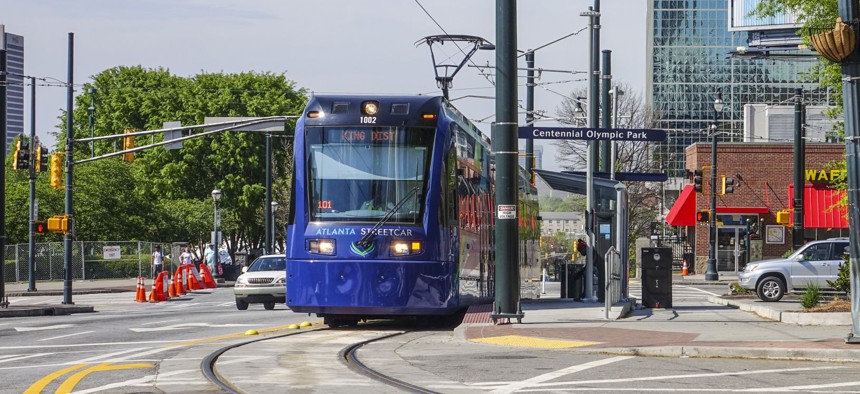Is the TIGER Grant Program About to Get ‘Slashed’?

A streetcar in Atlanta. Shutterstock
U.S. Senate lawmakers suggested Wednesday that the infrastructure funding program could be imperiled by budget priorities President Trump is expected to push for.
WASHINGTON — Leaders of a U.S. Senate panel raised concerns Wednesday that President Trump’s forthcoming budget proposal could put funding at risk for a key infrastructure grant program used by states and local governments.
“I fully expect, when we get the budget, that we may well see the TIGER grant program slashed,” U.S. Sen. Susan Collins, a Maine Republican, said during a meeting of the Senate Appropriations subcommittee on Transportation, Housing and Urban Development.
Collins, who chairs the subcommittee, suggested she was willing to advocate for preserving TIGER grants. At one point, the senator called it one of her “favorite programs” and asked one of the witnesses offering testimony to identify benefits that could help her “make the case” for it.
Since 2009, Congress has allotted close to $4.6 billion to TIGER—formally called Transportation Investment Generating Economic Recovery—grants. The competitive program is open to state and local governments, along with other public entities like transit agencies and port authorities.
TIGER dollars have gone toward projects ranging from a streetcar line in Atlanta to safety improvements in New Mexico on U.S. 491, a rural highway in the Four Corners region.
Applications for funding tend to far outpace the TIGER grant money that is available. In 2016, the U.S. Department of Transportation received 585 eligible applications from all 50 states.
Beth Osborne, a senior policy adviser for the nonprofit group Transportation for America, said in testimony to the subcommittee that agencies she has encountered often “have something they want to try on the books” and the competition for TIGER grants is “what gets it off the shelf.”
She also said the range of eligible projects, such as ports, transit and highways, is one reason the program is popular. “Since the loss of earmarks this is one of the only programs that allows local and county governments to directly access federal funds,” Osborne added.
Mayors visiting Capitol Hill last week highlighted the TIGER grant program as the type of initiative they’d like to see supported as Trump seeks to increase infrastructure investment.
Trump has vowed to invest $1 trillion in the nation’s infrastructure through a combination of public and private financing.
But the president is also looking to boost defense spending by $54 billion.
That increase is expected to be accompanied by proposals for widespread reductions in other parts of the federal government. The Trump administration has outlined plans to deliver congressional lawmakers a blueprint of the president’s budget proposal late next week.
U.S. Sen. Jack Reed, a Rhode Island Democrat, is the ranking member on the Transportation, Housing and Urban Development subcommittee. He said Wednesday that if steep budget cuts that the administration is contemplating are imposed it would be “impossible to sustain even today’s funding levels” for infrastructure programs like TIGER.
Wednesday’s hearing focused on options for where money could come from to pay for infrastructure spending.
Central to discussions about Trump's call for new spending have been questions about how much investment might come from federal sources, versus the private sector.
David Bernhardt, president of the American Association of State Highway and Transportation Officials and commissioner of the Maine Department of Transportation was among the other witnesses who testified at the subcommittee meeting.
“Any major infrastructure package must focus on direct funding, rather than on federal financing support,” he said.
Most transportation projects in Maine, Bernhardt said, cannot generate sufficient money from revenues like tolls and fares to service debt or provide adequate returns on private investments.
He made a case that any increase in federal funding for transportation infrastructure should flow through the existing “formula-based” program structure that is part of the 2015 Fixing America's Surface Transportation Act, rather than “through untested new approaches.”
Details about how the Trump administration’s infrastructure package could look are still limited.
It’s also unclear when exactly Congress will be free to take up infrastructure legislation. Lawmakers are currently occupied with a Republican-led effort to repeal and replace the Affordable Care Act and will need to attend to the budget in the coming months as well.
Collins told reporters after Wednesday’s hearing that she thought Congress would shift its attention to infrastructure “considerably later this year.”
Bill Lucia is a Senior Reporter for Government Executive’s Route Fifty and is based in Washington, D.C.
NEXT STORY: New role for the mainframe






